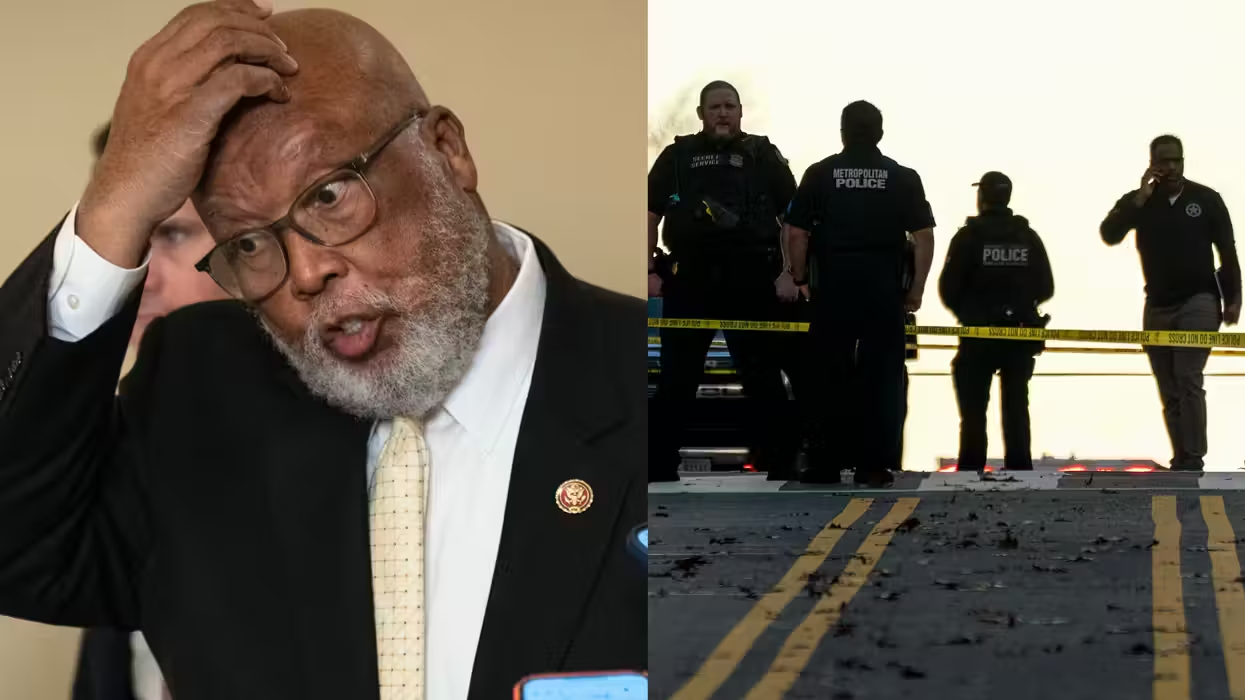During U.S. President Barack Obama’s televised speech on his strategies to defeat the ISIS, he said, “Now, it will take time to eradicate a cancer like ISIL” (a reference to the Islamic State, or “ISIS”).
Now, why is that?
First, we know by “cancer” he is not referring to Islamic ideology—since he does not acknowledge that Islam has anything to do with violence and even banned knowledge of Islamic ideology from being studied by law enforcement and national security communities.
Were he referring to Islamic ideology, the need for “time” would of course be legitimate, to say the least.
No, the cancer he is referring to is the very real, tangible, and temporal ISIS, which exists in time and space.
But this prompts the following question: Why did it take the United States military three weeks to overthrow the very real and tangible regime of Saddam Hussein in 2003 whereas “it will take time”—years, according to most military analysts—for the U.S. to defeat ISIS?
 A Syrian Kurdish girl is reflected in a puddle in a refugee camp in the town of Suruc, Sanliurfa province, on October 17, 2014 during sun rise. Kurdish rebels have been infuriated by the lack of action by Turkey against Islamic State (IS) jihadists trying to take the mainly Kurdish town of Kobane just across the Syrian border. AFP PHOTO / ARIS MESSINIS
A Syrian Kurdish girl is reflected in a puddle in a refugee camp in the town of Suruc, Sanliurfa province, on October 17, 2014 during sun rise. Kurdish rebels have been infuriated by the lack of action by Turkey against Islamic State (IS) jihadists trying to take the mainly Kurdish town of Kobane just across the Syrian border. AFP PHOTO / ARIS MESSINIS
This question becomes more pressing when one considers that the Iraq conquered by the U.S. in less than a month had an actual government and longstanding military and was better organized and consolidated—certainly in comparison to ISIS, often described as a “ragtag team of terrorists” that seems to have appeared out of nowhere.
The reason it will take years is because Obama refuses to strike ISIS decisively and effectively, specifically by sending in U.S. ground forces—the very forces that were responsible for keeping the Islamic jihadis at bay; the forces he withdrew leading to the rise of ISIS; and the forces that he refuses to utilize again, even though they are necessary to decisively crush the “caliphate.”
Obama’s “it will take time” assertion prompts the following prediction: U.S. airstrikes on ISIS targets will continue to be just enough to pacify those calling for action against the caliphate (“we’re doing what we can”). The official narrative will be that ISIS is gradually being weakened, that victory is a matter of time (remember, “It will take time”).
In the meantime, ISIS will slowly begin to fade away from the headlines. After all and unreported in any Western media, soon after pictures and videos of the decapitations of Americans went viral prompting much media attention followed by international shock and outrage, the “caliph,” Abu Bakr al-Baghdadi, called for an immediate stop to the videotaping and internet dissemination of such beheadings and other Sharia punishments.
He called on both official channels affiliated with ISIS as well as unofficial sympathizers and allies on social media to cease posting such pictures and/or video-clips, adding that the ISIS “would follow any violation of this resolution seriously.”
It is these images of utter savagery that first catapulted the ISIS into the spotlight, eventually causing Americans to call on U.S. leadership to respond, and it is these images that forced Obama to react to the “caliphate.”
Had ISIS members not posted those many images of cruelty which went viral, the world would likely know little about them—Western mainstream media would certainly not have been the ones to expose them—and Obama would not now be required to condemn and engage them.
But apparently that was the price the ISIS had to pay to inspire and mobilize many more Islamic terrorists—to prompt them to raise their heads up high and to “heal their hearts.” Time will tell if the majority will heed their new caliph’s resolution or not.
If the jihadis do comply, things will quiet down; the mainstream media will return to more familiar, more Kardashian headlines; we will hear about the occasional victory against ISIS—this or that leader killed or captured—even as the administration continues to exploit the conflict in a way to attack neighboring Syrian leader Bashar Assad (with the inevitable result that more jihadis will once again fill the vacuum created by his departure, as they did in post-Arab-Spring Libya).
Then, just as they “suddenly” appeared in Iraq, we will “suddenly” again hear—probably first from ISIS itself—that it has made some major comeback, winning over some new piece of territory, as the caliphate continues to grow and get stronger.
In this context, Obama’s call for “time” appears to be less about a true need and more about getting Americans to forget about ISIS, at least until he is out of office.
–
TheBlaze contributor channel supports an open discourse on a range of views. The opinions expressed in this channel are solely those of each individual author.


 A Syrian Kurdish girl is reflected in a puddle in a refugee camp in the town of Suruc, Sanliurfa province, on October 17, 2014 during sun rise. Kurdish rebels have been infuriated by the lack of action by Turkey against Islamic State (IS) jihadists trying to take the mainly Kurdish town of Kobane just across the Syrian border. AFP PHOTO / ARIS MESSINIS
A Syrian Kurdish girl is reflected in a puddle in a refugee camp in the town of Suruc, Sanliurfa province, on October 17, 2014 during sun rise. Kurdish rebels have been infuriated by the lack of action by Turkey against Islamic State (IS) jihadists trying to take the mainly Kurdish town of Kobane just across the Syrian border. AFP PHOTO / ARIS MESSINIS






